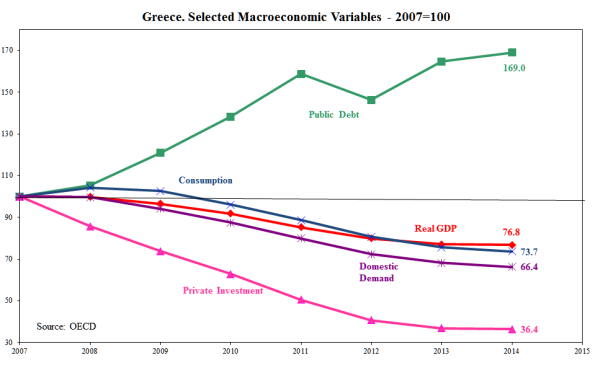Greek Tragedies, 2014 Edition
Last week’s publication of a Lancet article1 on the effect of austerity on Greek public health made a lot of noise (for those who know Italian, I suggest reading the excellent Barbara Spinelli, in La Repubblica).
The Lancet article sets the tone since the abstract, talking of “mounting evidence of a Greek public health tragedy”. It is indeed a tragedy, that highlights how fast social advances may be reversed, even in an advanced economy.
Some time ago (March 2012) I had titled a post “Greek Tragedies“. Mostly for my students, I had collected data on Greek macroeconomic variables. I concluded that austerity was self-defeating, and that at the same time it was imposing extreme hardship on Greek citizens. Of course one needed not be a good economist to know what was going on. It was enough not to work at the Commission or in Germany… But the Lancet article also allows to substantiate another claim I made at the time, i.e. that austerity would also have enormous impact in the long run. It is weird to quote myself, but here is my conclusion at the time:
Even more important, investment (pink line) was cut in half since 2007. This means that Greece is not only going through depressed growth today. But it is doing it in such a way that growth will not resume for years, as its productive capacity is being seriously dented.
What makes it sad, besides scary, is that behind these curves there are people’s lives. And that all this needed not to happen.
I think it is time for an update of the figure on the Greek tragedy. And here it is:
 I said in 2012 that investment cut in half spelled future tragedy. Two years later it is down 14 more points, to 36% of 2007 levels. I am unsure the meaning of this is clear to everybody in Brussels and Berlin: when sooner or later growth will resume, the Greek will look at their productive capacity, to discover it melted. They will be unable to produce, even at the modest pre-crisis levels,without running into supply constraints and bottlenecks. I am ready to bet that at that time some very prestigious economist from Brussels will call for structural reforms to “free the Greek economy”. By the way, seven years into the crisis, the OECD keeps forecasting negative growth together with unsustainable (and growing) debt.
I said in 2012 that investment cut in half spelled future tragedy. Two years later it is down 14 more points, to 36% of 2007 levels. I am unsure the meaning of this is clear to everybody in Brussels and Berlin: when sooner or later growth will resume, the Greek will look at their productive capacity, to discover it melted. They will be unable to produce, even at the modest pre-crisis levels,without running into supply constraints and bottlenecks. I am ready to bet that at that time some very prestigious economist from Brussels will call for structural reforms to “free the Greek economy”. By the way, seven years into the crisis, the OECD keeps forecasting negative growth together with unsustainable (and growing) debt.
I also added unemployment to my personal “Greek Tragedy Watch”:  Terrifying absolute numbers (almost 30% unemployment overall, youth unemployment around 60%, more than that for women!). And absolutely no trend reversal in sight. A final consideration, related to the melting of the capital stock. How much of this enormously high unemployment, is evolving into structural? How many of the unemployed will the economy be able to reabsorb, once it starts growing again? Not many, I am afraid, as there is no capital left.
Terrifying absolute numbers (almost 30% unemployment overall, youth unemployment around 60%, more than that for women!). And absolutely no trend reversal in sight. A final consideration, related to the melting of the capital stock. How much of this enormously high unemployment, is evolving into structural? How many of the unemployed will the economy be able to reabsorb, once it starts growing again? Not many, I am afraid, as there is no capital left.
Not bad as an assessment of austerity… And yet, just this morning the German government complained for a very limited softening of austerity demands. Errare umanum est, perseverare autem diabolicum…
1. Kentikelenis, Alexander, Marina Karanikolos, Aaron Reeves, Martin McKee, and David Stuckler. 2014. “Greece’s Health Crisis: From Austerity to Denialism.” The Lancet 383 (9918) (February): 748–753. Back

Reblogged this on Gangstalked and slandered.
LikeLike
Take a look at The Definition of a Pathocracy
LikeLike